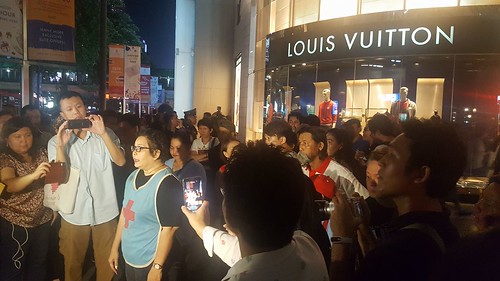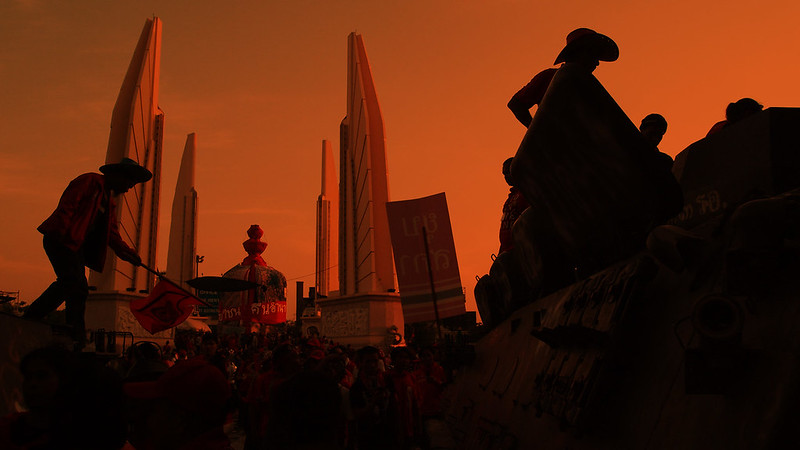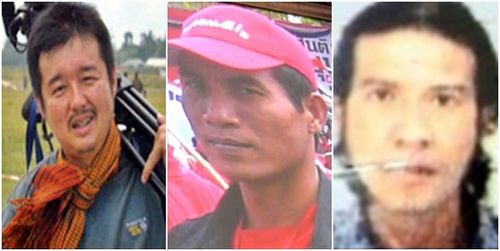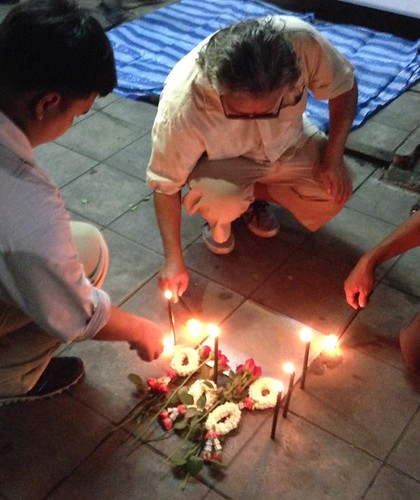“Today, the struggle is not over yet. This mother will struggle until the end...I believe that the perpetrators will not get away,” said Payao Akhad, mother of Kamolkate Akhad, a medic who was killed during the 2010 crackdown on red-shirt protesters. She spoke while lighting incense for her late daughter at Ratchaprasong intersection in central Bangkok on 31 August 2017.
For her, and for the other families whose sons, daughters, or parents perished during the military crackdown which took more than 90 people’s lives and injured over 2,000 people, the recent Supreme Court ruling to dismiss murder charges against former Prime Minister Abhisit and Suthep, his former deputy, was like having salt rubbed into wounds which have not healed after seven years.

Payao Akhad calling for justice for her late daughter at Ratchaprasong Intersection on 31 August 2017 after the Supreme Court read the dismissal verdict
Despite overwhelming evidence that soldiers used live ammunition to kill protesters, the Supreme Court confirmed the ruling of the lower courts not to prosecute those who authorised the bloody crackdown on the grounds that only the Office of the National Anti-Corruption Commission (NACC) has the authority to process the case. Ironically, the former Director-General of the Department of Special Investigation (DSI) and three others are facing lawsuits for filing these murder charges against Abhisit and Suthep.
Prachatai has compiled the conclusions of the various inquests into the causes of death of those killed during the 2010 crackdown.

The red-shirt protest in April 2010 (Photo by Noppakow Kongsuwan)
Wat Pathum shooting
In August 2013, the Criminal Court ruled that six people who were killed on 19 May 2010 at Wat Pathum Wanaram in central Bangkok, which had been designated a sanctuary, were killed by high velocity bullets fired by military personnel stationed on the BTS rail tracks overlooking the temple. The six are Suwan Sriraksa, Atthachai Chumchan, Mongkhol Khemthong, Rop Suksathit, Kamolkate Akhad, and Akkharadet Khankaew.

The corspes of some of the people who were killed at Wat Pathum Wanaram on 19 May 2013 (file photo)
Foreigners
In May 2013, the Criminal Court ruled that Fabio Polenghi, a 48-year-old Italian photographer killed on 19 May 2010, was shot by a bullet coming from the direction of the army on Ratchadamri Road.
In a separate case, the court ruled in April 2015 that there was no evidence to indicate who was responsible for the death of Hiroyuki Muramoto, a Japanese Reuters cameraman, who was shot dead in front of Satriwithaya School on Din So Road close to the Democracy Monument on 10 April 2010. However, three eyewitnesses who were in close proximity to Hiroyuki testified that gunshots were heard and muzzle flashes were seen from the direction of the military when the cameraman was killed.

From left to right, Hiroyuki Muramoto and two others who were killed at the same location, Wasan Phutai and Todsachai Maekngamfa (file photo)
Youth
The Criminal Court ruled that Kunakorn Srisuwan, a 16-year-old boy, was shot on 14 May 2010 by bullets fired from the direction of the military on Ratchaprasong Road. A day after he was shot, Samaphan Srithep, 17, was fatally shot at Soi Rang Nam on 15 May 2010 when the authorities were attempting to block access to the red shirt rally. The inquest has not yet been concluded.

Phansak Srithep, Samaphan’s father, lighting candles around a plaque installed to commemorate his late son on 15 May 2017 (Photos from Resistant Citizens)
The Criminal Court also ruled that 10 other people were killed by bullets fired from the direction of the army. The 10 are Charnnarong Polsrila, Narin Srichomphu, Mana Ajran, Jaroon Chaima, Siam Wattananukul, Chartchai Chalao, Private Narongrit Sala, Phan Kamkong, Thawin Kammool, and an unnamed man.
In the seven years since the April-May 2010 crack-down, the Criminal Court has ruled on 30 deaths in a total of 20 cases, with 18 out of the 30 people judged to have been killed by bullets coming from the military.
Prachatai English is an independent, non-profit news outlet committed to covering underreported issues in Thailand, especially about democratization and human rights, despite pressure from the authorities. Your support will ensure that we stay a professional media source and be able to meet the challenges and deliver in-depth reporting.
• Simple steps to support Prachatai English
1. Bank transfer to account “โครงการหนังสือพิมพ์อินเทอร์เน็ต ประชาไท” or “Prachatai Online Newspaper” 091-0-21689-4, Krungthai Bank
2. Or, Transfer money via Paypal, to e-mail address: [email protected], please leave a comment on the transaction as “For Prachatai English”
